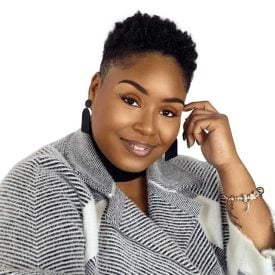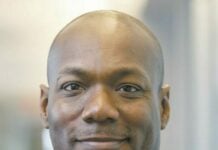From the city of Detroit, Michigan, I grew up around a plethora of experiences including navigating the hood and the suburbs.
I watched as individuals close to me chose survival every day, having to hustle for their next meal and praying for their next blessing. This was a place where thriving was intertwined in materialistic gain because we had to prove we weren’t underdogs or “products of the environment.”
Early on, I learned that being quick on your feet, having critical thinking skills, well thought out responses, and quick decisiveness was a requirement to make it through the spaces I occupied. I watched members of my family experience destruction due to limitations; no access to food, financial insecurity, substance abuse, fear, confusion and using love as a radical tool to thrive.
Then I learned these experiences were not exclusive to my family or my neighborhoods. These experiences were happening to communities of culture across the landscape of America and around the world. I witnessed the deterioration of school systems, homes in low-income communities, a lack of access to health care, public safety services and grocery stores. It baffled me as a child to see unhoused individuals being ignored, denied basic needs and access to services. I watched as applications for government assistance were piling up, waiting to be reviewed or flat out denied. I saw churches become the ticket for survival and the only places we could hope to receive support.
These experiences continue to impact me today. It informs the way I engage with individuals from different backgrounds and identities. It helps me cut through tension and frustration to get to the root cause of inequities. It reminds me to remain involved in my communities and to hold systems accountable via my role in leadership and responsibility as a civil servant. It’s the cracking of my grandfather’s voice when he saw the climate around race look very similar to his experiences in Ware Shoals, South Carolina during the 40s and 50s in 2024.
I chose the work of diversity, equity and inclusion to move beyond lip service into action. I saw an opportunity to interrupt systems creating harmful experiences. I leaned into the opportunity to expose these systems and individuals while holding them accountable to review their programs, practices and policies to identify equity gaps and employ intentional solutions.
I knew the work of diversity, equity and inclusion was not new, but a continuation of the work done by our historic civil rights leaders, known and unknown by the masses, those who were in local communities, leadership positions, young adults and seasoned saints. They did the work because they wanted to ensure their families and communities would receive the support they needed. These individuals did not do the work to receive a book deal, an invitation to be a keynote speaker or panelist, they did it because they had a generation to protect. Knowing this, I take my positionality in diversity, equity, and inclusion work seriously, but I want it to be accessible.
In my role as a director of Diversity, Equity and Inclusion, I facilitate training, critical discussions and opportunities for mindset growth to move beyond the negative narratives associated with this work. I have done this work as a consultant at multiple higher education institutions, public and private sectors, small and large businesses and worked directly with executive leadership to identify equity gaps that will intentionally improve the climate and experience for everyone within the organization, while calling out the historical gaps impacting some identities more than others.
In February of this year, I was selected as the Diversity, Equity and Inclusion Advocate of the Year presented by Eli Lilly for the ELEVATE awards by the United Way of Central Indiana. This honor reminded me of the work I am aligned with and continued to showcase the value of DEI in all spaces.
Thinking back to my graduating year of high school, 2008, I never imagined being able to uplift, center and challenge systems via diversity, equity and inclusion. I grew up low-income and often was reminded I would not make it out of the neighborhoods I occupied. I graduated high school with a 1.8 GPA and a ton of fear to move into the next phase of life. But I did not let that diminish or shift my plans to make a difference in the world.
The shame of graduating with a 1.8 GPA followed me for years. I attended a community college for three years, where I then transferred to Eastern Michigan University. Spending two years at this institution, I was able to join multiple student organization where I held a leadership role, I graduated from the Honors College with dual honors, received 14 academic scholarships, was mentioned in the president’s speech during graduation and went on to pursue my masters at Indiana University, graduating and now being a doctoral student in the Urban Education Studies (UES) program with an interdisciplinary focus on body diversity (BODEI) and diversity, equity and inclusion. My time spent in these spaces was intentional and continues to allow me to serve as a scholar practitioner.
I always want to make information accessible where people can utilize it to improve their lives and communities. This desire led me to lean into the nickname — DEI Homegirl. My approach to this work is intentional. I want you to understand, ask questions, seek clarification, learn, laugh and know you will be held accountable, and I expect you to do the same for me. Accountability does not have to be harmful or a tool to silence. It has to be intentional and equitable. With everything I have learned and continue to experience, I remind myself that those before me are the motivation to keep going when the world is choosing to ignore the value of DEI and lean into feeling inclusions does not matter.
This endeavor with the Indianapolis Recorder to share information about DEI is needed now, more than ever as we watch the rise of misinformation, hate and ignorance. This rise is more than clickbait and social media discussions. These actions are informing the programs, practices, and policies of our communities. To address these topics, I ask that you join me as your DEI Homegirl to use this platform to educate, challenge and redefine the narratives associated with DEI and its underpinnings. I’m excited to share this information with readers and hope that you will continue to join me to learn more and make critical changes.
As a reminder, the work is not always easy, but it is always needed. Remember, we are not here for a long time, but a good time. We’ve got work to do!
Take care friends!
Your DEI Homegirl
Follow Ellise A. Smith on LinkedIn at linkedin.com/in/ellisesmith.




